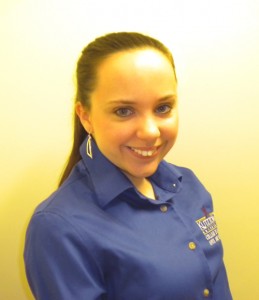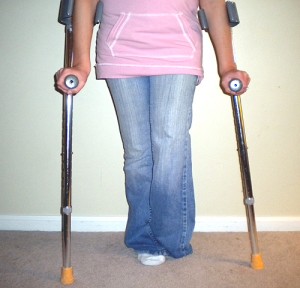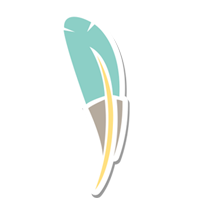Chasing a dream isn’t easy. All sorts of fears and obstacles stand in our way. Add a physical disability that impairs your ability to stand up straight and walk around and you might be able to think that it’s impossible. And for some, that is the case which is why some people need supplemental disability insurance. You can begin to understand some of the challenges Jackie Conley faces as she chases her dream of starting a non-profit organization to raise disability awareness. Today, Jackie joins us to share her inspirational story about how life on crutches and years of cruel torment fueled her desire to end discrimination and increase awareness about disabilities and the people who have them…
 Beyond the Gray: Welcome, Jackie! Please tell us a little bit about yourself and your dream. How are you working toward it?
Beyond the Gray: Welcome, Jackie! Please tell us a little bit about yourself and your dream. How are you working toward it?
Jackie Conley: My name is Jackie Conley and I am from Boyertown, PA. I have a few dreams that I am currently trying to achieve. In May 2011, I graduated with a degree in English/Professional Writing, and I am happy to report that after 5 long months of applying to jobs and going on interviews, I recently accepted a position in the marketing field. So I can check “get my first real job” off the list.
Later down the road, though, I really want to delve into my other dream, which is to create a business that aims to support people with disabilities in a way and on a level that other companies do not. My goal is to become a thriving nonprofit that seeks to end disability discrimination and increase awareness so that people don’t have as many questions when they encounter people with disabilities.
This effort was started during my time as an undergrad, for a class called Information Design: Writing for the Web taught by Dr. Michael Downing at Kutztown University, and has developed into a Facebook page, website and blog, all named Disability Awareness 4 You. I invite you all to join the community and support this initiative because I don’t want this group (or eventually company) to consist of just people with disabilities; rather, I want people from all walks of life who are interested in achieving a better world for people with disabilities to join the cause.
BTG: What challenges have you faced along the way and how did you overcome them?
JC: As this question relates to my first dream, to acquire a job in my field, I went on 6 interviews until I found my current position and I know that one of my biggest challenges in obtaining a job was not only the economy but my disability. Because I have a physical disability, it is hard for potential employers to not notice this difference and become uncomfortable by it. It was very frustrating and sometimes upsetting; however, I keep reminding myself that if a company was going to judge me after only one hour, based solely on my disability, I really don’t want to work for them anyway. But even that can be hard because I know some people take more time to get used to a person with a disability.
This is only making my goal of creating disability awareness more prominent. We are making strides when it comes to equal opportunities for all kinds of diverse populations, but we definitely haven’t achieved overall success just yet. And, don’t get me wrong, I do feel very blessed and lucky to have been offered a job so quickly after graduation; however, I do think we need to continue putting more effort into seeing the beauty in diversity. Awareness is obviously vital though. Without building awareness, we’ll never see results. That’s why it’s so important that we do all we can to get more people talking about disability. We recently had a suggestion from a member of this charity, they said we could consider booklet printing to make sure people fully understand our aims. With a booklet, we could fully explain what we’re trying to achieve and how we plan on doing it. That was a great suggestion, one that we’re considering to help us build awareness.
Another challenge, when it comes to my dream of creating a disability-related business, is financing. I know there are organizations that give nonprofit companies grants, but because I am in the process of just starting out in life (I am only 22 years old), I haven’t been able to fully dive into and focus on researching those opportunities. Everything takes time.
BTG: Tell us about a time you found yourself in “the gray”. How did you move beyond it?
JC: When I became a teenager, things started to get extremely difficult. All I wanted was a boyfriend, a companion, but because of the way I looked, they were few and far between. Being a teenager is hard for almost everyone, but for me it was an extraordinary challenge. At that point in my life, I hadn’t fully accepted my disability and the reality of my life as a person with a disability. People made fun of me by imitating the way I walked and I was much more aware of stares and confusing looks from strangers. I was in “the gray” because I was learning about a lot of the negatives that exist in our world.
Today I can say that I have moved beyond it in part because I found an inner strength that allowed me to love me for me, but I owe a huge part of that strength and confidence to my fiance, Nick, because he helped me realize that beauty is in the eye of the beholder.
BTG: You were born with Spina Bifida and you also suffer from Scoliosis. What are those conditions and how have they impacted your life and your ability to chase your dream?
JC: I was born with Spina Bifida, a birth defect that happens before the baby is born. Basically you are born with a hole in your back, and depending on where that hole is along your spine determines how SB will affect you. For me, the hole was in the mid-to-lower part of my back, causing my left leg to have paralysis from the knee down. It also caused me to have club foot, a dislocated left hip, and trouble balancing; therefore, I use crutches to walk. My left leg is also shorter than my right, so I have what is called a lift on my left shoes. In addition, I have a leg brace, which enables me to wear shoes. All of these differences caused me to have poor posture, which led to Scoliosis when I was around 9 years old. Spina bifida cannot be cured, but living with it can be made easier by visiting a professional, like Medical City Kids Orthopedics, who will offer either surgical or non-surgical treatments to improve quality of life. My Scoliosis, however, could be treated.
Doctors tried to fix my Scoliosis by inserting metal rods on both sides of my spine, but the surgery took too long and caused me to lose a large amount of blood, so they closed me up. They decided to try again, but the same thing happened, causing me to again almost bleed out on the operating table. Knowing that I almost died when I was just 10 years old really put life into perspective for me. For anyone considering undergoing a procedure like this, in the hopes of correcting their spine, be sure to think about it properly. It’s one thing to check out sites like scoliosis institute for some information, but it is another thing actually going through the surgery. Life is a short ride that we get to have here on earth, so that has made me live life to its fullest and chase all my dreams 100 percent. My disability has therefore impacted my life for the good because it helped me appreciate life in a way other people often don’t and has thus given me the courage to chase my dreams no matter how big or small they are.
BTG: Despite the physical challenges you face, positivity and gratitude play an important role in your life. Tell us about that. Does it ever get hard to stay positive?
JC: It would be absolutely false of me to say that it never gets hard to stay positive. In fact, it would be hard for anyone to say that they never feel sadness, anger, or frustration. That’s the way I look at everything when it comes to my disability. Everyone has things that they like and dislike about themselves, and I am no different. However, I will say this, after graduating high school and moving to college, I realized that life, for me anyway, is so much sweeter as an adult. I am more positive now because I know that if someone doesn’t like me because of my disability, it’s all right because I have friends that love me and could care less about my disability.
Around the time I graduated high school, I started seeing a local Grateful Dead tribute band, Splintered Sunlight. The minute I first met the “Splintered family,” no one stared or judged me. They simply said hello and made room for me on the dance floor and respected my space. Knowing that there are people in this world who will accept you through and through, without needing to know your life story, is very refreshing. The whole community has made me think of the word grateful in an entirely new light. I believe that too many people in this world aren’t grateful for what they have, and I can say now more than ever I am so grateful for my life, family, friends, and the simple things, too: my home, my cell phone, food to eat, and water to drink. So gratitude is extremely important to me. In fact, it’s one of the qualities I’d like to highlight and focus on as I develop Disability Awareness 4 You.
BTG: What impact do you hope to have on disability awareness?
JC: I really want to see a change within my lifetime. That change would be seeing people stare a little less, finding more people with disabilities coming out of their homes and taking on the world, and humanity accepting differences and embracing them because they will lead us to a brighter, more successful future. Think of it this way: if someone who uses crutches, like myself, started helping construction companies develop and design buildings, the buildings would probably be more effective and definitely more accessible to a broader range of people. So accepting people for their differences can be and IS a great thing.
If all else fails and I can’t fund a disability organization or do material things to help increase disability awareness, I will always try to be a positive representative of the disability community and encourage others to do and be the same, whether they are disabled or not.
BTG: During your recent commencement speech at Kutztown University you said, “Remember that crutches are just something you lean on to help you get from one place to the next.” Tell us what you mean by that.
JC: Physically, I depend on my crutches to help me walk and have mobility. To society, they look like a bad thing–something must have happened to me or I must be ill. For me, though, my crutches are a way for me to retain mobility and continue living life to its fullest. It’s the same thing with other people. Everyone leans on something or someone at some point in their life, and we shouldn’t be ashamed of it. If it helps us get to a positive place, or helps us become the people we were meant to be, why would we be ashamed of that? Crutches can be a great thing. Mine definitely are.
BTG: What inspires you?
JC: People who are kind. We are ALL overcoming obstacles–it’s not just people with disabilities, or kids with one parent, or people with addictions who face struggles–it’s everyone. So when I see someone being kind, despite whatever obstacle they may be facing, I am in awe and inspired to be a better person myself. Kindness is so important and I believe it is one of the ways to reach my ultimate dream for people with disabilities in this society.
BTG: If you could give one piece of advice to someone else who is struggling to follow a dream, what would it be?
JC: Be kind, persistent, confident, and work hard. These few qualities have always helped me get to where I want to be and have allowed me to keep climbing the ladder.
To learn more about Jackie, her disability, and her work visit Disability Awareness 4 You. Jackie welcomes you to Friend her on Facebook but asks that you send her a private message letting her know that you saw her story here.
Are you chasing a dream? If so, I’d love to hear from you!
Shoot me an e-mail at: erika [at sign] erikaliodice [dot] com



